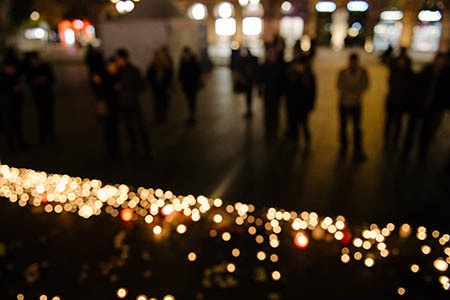On Sunday, Salman Afzaal, 46, his wife Madiha Salman, 44, daughter Yumna Salman, 15, and her 74-year-old grandmother died, and Fayez Salman, their 9 year old son, remains in hospital after a horrifying hit and run targeted at the family because of their Muslim faith. This evening, as the news unfolds, we mourn the victims and extend our deepest sympathies to their son, for whom our hearts break, and to their families, their communities, and to Muslim Canadians.
In classrooms tomorrow, some students may feel pain, fear, outrage and sadness, or confusion. For students who may be in crisis, turn to your school administration or school board, district, or educational authority to seek support.
We hope the following ideas may be helpful as you consider how to process this news in your classrooms:
-
Before engaging in difficult conversations, consider your relationship, and students' relationship to the events in the news. What personal connections might the students you teach make in this moment?
-
Let your students know that your classroom is a safe space to find community in a time of grief, and solidarity in a stand against identity- based hate, and Islamophobia in particular. Begin with a brief contracting (for remote or in person learning) activity if you have not already forged that courageous and intentional space.
-
Then follow with acknowledgement. This is not a moment to go straight to the “head” or to cognitive work. Give your students a few moments to reflect and to write some of their feelings and questions. They could then share these with a peer in a virtual breakout space (on Zoom/Meet/Teams, on a Padlet), or on a walk and talk outside.
You might use the following writing prompts:
-
-
The hate-motivated attack on a Muslim family in London, ON (whose relatives requested that their names be withheld at the time of posting) is horrifying and painful to learn about. This painful loss prompts us to ask many questions, some of which may not have an answer. What questions does this event raise for you? What feelings does it provoke?
-
What can we do if we ourselves are feeling vulnerable? What tools do we have to practice self-care? What do we need from others to feel seen, heard and supported?

-
Graffiti boards and S-I-T are two other teaching strategies that can help students reflect on difficult topics.
After they have had some time to process the emotions raised by this event:
-
You might help them begin to wrestle with what happened. Perhaps begin with a K-W-L chart to help students understand the facts.
-
Acknowledge that this hate-motivated attack exists within the context of a history of Islamophobia in Canada and recognize the ways in which Islamophobia impacts Muslim communities.
-
Discuss with students:
-
-
How can we stand with and support others - especially Muslim members of our community - who are feeling vulnerable?
-
What can we do as individuals and as a community to see and value the diverse identities and contributions of Muslims here and across Canada?
- What are some meaningful actions we can take, even if only in our own home, neighborhood, or school? Consider creating a Toolbox for Care based on this activity with students, or taking inspiration from the actions people have taken to stand up to hate in Not In Our Town
-
Note: If this event triggers conversations about bigotry and Islamophobia experienced by members of the class, consider sharing the 5 D's bystander intervention tools created by iHollaback to equip students to be allies in future
Take Time to Remember the Victims
- The London Muslim Mosque is hosting a vigil at 7 PM (EST) on Tuesday, June 8th. Consider inviting students to host or join a virtual vigil in solidarity at that time.
A Note from us to you
We understand the enormity of the task facing teachers who are already juggling numerous responsibilities and are yet again charged with helping young people make sense of devastating events in the world around us. It is easy to feel disheartened, but we believe that making the classroom a community where students can learn, reflect, and respond to the world around them together is an essential part of educating and taking care of our young people.
If you, your students or your community want to contribute to the GoFundMe page click here.
For more information on The National Council of Canadian Muslims and the National Action Summit for standing up to Islamophobia click here.

